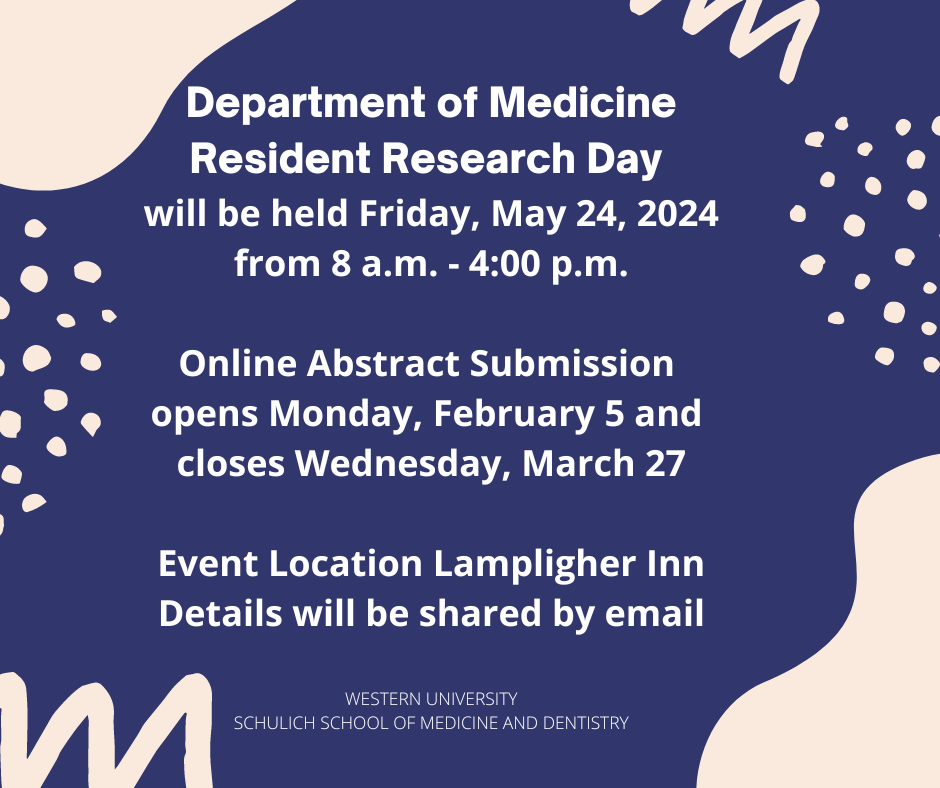| Clinical Pharmacology george.dresser@lhsc.on.ca |
|||
 GEORGE DRESSER, MD, FRCPC, PhD, Associate Professor GEORGE DRESSER, MD, FRCPC, PhD, Associate Professor
Dr. Dresser completed his undergraduate and graduate training in Internal Medicine at the University of Western Ontario in London, Ontario, Canada. After receiving his accreditation in Clinical Pharmacology from the Royal College of Physicians and Surgeons of Canada, he completed a post-doctoral fellowship position in Clinical Pharmacology at Vanderbilt University in Nashville, TN. He is now an Associate Professor at the University of Western Ontario where he is active clinically in General Internal Medicine and Clinical Pharmacology. Dr. Dresser successfully defended his Ph.D. in Pharmacology in January, 2004. His thesis describes the effects of a number of dietary constituents and herbal products on drug absorption from the gastrointestinal tract. He is also interested in what the human genome can tell us about individual patient response to drug therapy. Dr. Dresser is interested in better utilizing technology to enhance patient-physician interactions in the outpatient setting. Research Activities Hypertension - (any aspect: clinical approach, risk stratification, secondary causes, rational therapeutics, etc). Recently working on web based medical history direct entry by patients. Atherosclerosis - (new risk factors, risk estimation, old risk factors in new patients, preventative Rx, treatment, etc) Hyperlipidemia Drug-drug interactions: Conceptual approach Adverse drug events/effects: Conceptual approach Keywords: Adverse drug events/effects: Conceptual approach Atherosclerosis Drug-drug interactions: Conceptual approach Hyperlipidemia Hypertension | |||
| Clinical Pharmacology steven.gryn@lhsc.on.ca |
|||
 STEVEN GRYN, MD, FRCPC, Associate Professor STEVEN GRYN, MD, FRCPC, Associate ProfessorDr. Gryn graduated from the University of Western Ontario medical school in 2009. He remained at Western for his Internal Medicine training, including a term as Chief Medical Resident, and subsequently completed his Clinical Pharmacology & Toxicology subspecialty residency here as well. His primary clinical and research interests focus on adverse drug reactions and optimal therapeutics, particularly relating to the prevention of vascular disease and stroke. Keywords: Adverse drug reactions Anticoagulation Drug-drug interactions Dyslipidemia Hypertension Personalized Medicine | |||
| Clinical Pharmacology dhackam@uwo.ca |
|||
 DANIEL HACKAM, MD, FRCPC, PhD, BSc, Associate Professor DANIEL HACKAM, MD, FRCPC, PhD, BSc, Associate Professor Daniel Gidon Hackam BSc MD PhD FRCPC is an Assistant Professor in the Divisions of Clinical Pharmacology and Clinical Neurological Sciences and the Department of Epidemiology and Biostatistics. Dr. Hackam is a scientist at the Robarts Research Institute, Clinical Trials Research Group and Vascular Biology Group. His research is diverse and focuses on the pharmacoepidemiology of atherosclerosis, risk factor assessment, and translation of novel findings from basic science to clinical trials. His background includes training in internal medicine, clinical pharmacology, cardiac rehabilitation, clinical epidemiology and health services research. Dr. Hackam’s publications have appeared in The Lancet, JAMA, Circulation, Stroke, Neurology, American Journal of Medicine, CMAJ, BMJ and in numerous research forums and symposia. Keywords: Atherosclerosis prevention and therapy Meta-analysis, Development of new methodologies Pharmacoepidemiology including adverse drug events Systematic reviews, Development of new methodologies | |||
| Clinical Pharmacology Richard.Kim@lhsc.on.ca |
|||
 RICHARD KIM, MD, FRCP(C), FACP, FCAHS RICHARD KIM, MD, FRCP(C), FACP, FCAHSWolfe Medical Research Chair in Pharmacogenomics Professor of Medicine, Physiology & Pharmacology, and Oncology Chair, Division of Clinical Pharmacology & Toxicology Dr. Kim received his medical degree from University of Saskatchewan, Canada in 1987. After completing an internship and residency training at Royal University hospital in Saskatoon Canada in 1991, he went on to carry out postdoctoral fellowship training in Clinical Pharmacology at Vanderbilt University. In 1994, upon completion of his fellowship training, he remained at Vanderbilt Clinical Pharmacology and rose through the ranks to full Professor by 2004. July 2006, he and his group moved from Vanderbilt University to the Department of Medicine at the University of Western Ontario, to lead a program of Translational and Personalized Medicine research. He is currently Professor and Chair of the Division of Clinical Pharmacology, Associate Chair for Research in the Department of Medicine at the University of Western Ontario in London, Canada. He is a Scientist at the Lawson Health Research Institute. His research interest is that of understanding the molecular basis of interindividual differences in drug disposition and the application of such finding to the emerging field of Personalized Medicine. Dr. Kim is known for his pioneering work on the role of drug transporters as determinants of variable drug response and toxicity. His seminal 1998 publication in the Journal of Clinical Investigation that outlined a key role of the efflux drug transporter P-glycoprotein in limiting the CNS entry of HIV protease inhibitors provided a mechanistic basis for why HIV may be able to survive in organs such as the brain, and thereby viewed as “sanctuary” sites for viral replication. This publication has been cited over 1,000 times. In addition, Dr. Kim’s group was the first to identify and functionally characterize genetic variation in a transporter now referred to as OATP1B1 (gene name SLCO1B1) in 2001. He showed the importance of SNPs in this transporter to the clearance of statin class of lipid lowering drugs. A commonly occurring functional single nucleotide polymorphism (SNP) first identified by Dr. Kim’s group in this transporter has now been shown in a large clinical trial (SEARCH Group. New Engl. J. Med, Aug 2008) as the most predictive genetic marker for statin-induced myopathy. This has a major clinical implication since nearly 3 million Canadians are on statin therapy. Dr. Kim has also been at the forefront of fundamental research on regulation of drug metabolizing enzymes. His group was the first link a critical role of a liver-enriched nuclear receptor called HNF4alpha to the CYP3A4-mediated (an enzyme responsible for the metabolism of nearly 50% of all the drugs in clinical use) inductive process (Nature Medicine 2003). His publications have been cited over 21,000 times at a rate of at least 1000 citations/year with an average citations of 104/publication, with an h-index of 76. He is an internationally recognized leader in the field of pharmacogenomics, both in the identification of clinically relevant genetic variations, but also in the application of such finding to the delivery of Personalized Medicine to our patients. His group was the first in Canada to start a personalized warfarin clinic at the University Hospital, at the London Health Sciences Centre in 2008. He is now moving forward with a comprehensive Personalized Medicine Program focused on individualization of drug therapy for cancer, vascular diseases, diabetes, children, and the elderly. Dr. Kim received the Leon-Goldberg Young Investigator Award from the American Society for Clinical Pharmacology and Therapeutics in 2000, New Investigator Award from the International Society for the Study of Xenobiotics (ISSX) in 2002. In 2008, he received the inaugural Lawson Innovation Prize. In 2010 he was awarded Cancer Care Ontario Research Chair (Tier-1) in Experimental Therapeutics. In 2012, he was awarded the Wolfe Medical Research Chair in Pharmacogenomics from Schulich School of Medicine & Dentistry at Western. He is a Fellow of the American Society for Pharmaceutical Sciences (AAPS), and an elected Member of the American Society for Clinical Investigation (ASCI) and Canadian Academy of Health Sciences (CAHS). Keywords: Clinical Pharmacology Drug metabolism Drug transport Personalized Medicine Pharmacogenomics | |||
| Clinical Pharmacology Ute.Schwarz@lhsc.on.ca |
|||
 UTE SCHWARZ, PhD, Assistant Professor UTE SCHWARZ, PhD, Assistant ProfessorDr. Schwarz is an Associate Professor in the Division of Clinical Pharmacology, Department of Medicine and Department of Physiology & Pharmacology. She received her medical degree at the Technical University Dresden, Germany in 1995, and received her accreditation in Clinical Pharmacology from the Saechsische Aerztekammer, Dresden, Germany in 2003. She completed a postdoctoral fellowship in Clinical Pharmacology at Vanderbilt University in Nashville, USA (1999-2000), and joined the Division of Clinical Pharmacology, Department of Medicine, at Vanderbilt University as a junior faculty member in 2004. In 2012, Dr. Schwarz completed her Ph.D. graduate training in Pharmacology & Toxicology at the University of Western Ontario under the supervision of Dr. Richard Kim. In 2005, she was awarded the Presidential Trainee Award by the American Society for Clinical Pharmacology and Therapeutics (ASCPT), and was recipient of a Western Graduate Research Scholarship in Pharmacology & Toxicology, University of Western Ontario (2007 - 2012). Within the Personalized Medicine Program, her translational research pursues studies evaluating genetic and environmental factors that influence variation in drug exposure, therapeutic response, and toxicity in adult and pediatric patient populations with focus on drug metabolizing enzymes and drug transporters. Specifically, Dr. Schwarz’s research is focused on better understanding interpatient variability in blood exposure and adverse effects of direct oral anticoagulants (also DOACs), a new class of medications prescribed in patients with atrial fibrillation to prevent strokes. Her collaborative research in the area of oncology aims to discover and apply pharmacogenetic factors that can better predict the therapeutic and/or adverse drug responses of the chemotherapeutic agents 5-fluorouracil and tamoxifen in patients with colorectal and breast cancer (Collaboration Dr. Richard Kim). Other studies evaluate if genotype-guided dosing of mercaptopurine in children with acute lymphoblastic leukemia (ALL) prevents severe bone marrow toxicity and if genetic markers and blood exposure of methotrexate predict renal toxicity in pediatric ALL. Another area of interest relates to how genetic factors may help optimize the prescribing of anti-nausea medications for children undergoing cancer therapy (Collaboration Dr. Alexandra Zorzi). A current project applies cell-based and transgenic mouse models as well as a clinical study in subjects at high risk for type 2 diabetes to investigate underlying mechanisms of statin-induced impaired beta cell function involving drug transport. To aid in the discovery of novel pharmacogenetic predictors, Dr. Schwarz has been leading the development and validation of a next-generation gene sequencing strategy targeting exomes of 100 drug metabolizing enzymes, transporters, and drug targets. She is a member of several Professional organizations, including the Canadian Society of Pharmacology and Therapeutics (CSPT), the International Society for the Study of Xenobiotics (ISSX), and the Pharmacogenomics (PGx) Expert Group in the Ontario Health Provincial Genetics Program. Keywords: Chemotherapeutics Drug metabolizing enzymes Drug transporters Drug-drug interactions Oral anticoagulants Personalized medicine Pharmacogenetics Pharmacokinetics Statins | |||


